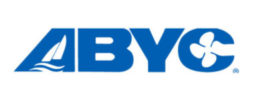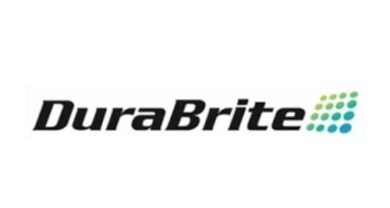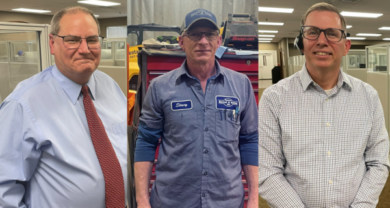Frye resigns to become Vinings president
WASHINGTON, DC – In an exclusive interview with Boating Industry magazine, Jim Frye discusses his resignation as executive director of the Association of Marina Industries (AMI) to join Vinings Marine Group as president.
While Frye retains his role as voluntary president of AMI, he also has resigned his position as director of Marinas and Boating Access with the National Marine Manufacturers Association (NMMA). Frye concludes his staff duties at both associations on June 23.
In the interview, Frye looks back at how the association has changed during his almost nine years of leadership, turns inward to evaluate himself and then looks to the future – his own and that of the association and industry.
Credited with increasing the industry’s awareness of water access as an issue that could have a significant impact on the future of boating, Frye has also led the marina association through several major transitions. They include the merger of MOAA and the International Marina Institute to form AMI, the establishment of National Marina Day and the creation, along with the American Boat Builders and Repairers Association and IMI, of the National Marina and Boatyard Conference.
Here is the full transcript of the interview:
Boating Industry (BI): How long have you been executive director of the national marina association?
Jim Frye (JF): I joined the Marina Operators Association of America in August of 1997; so it’s almost 9 years.
BI: What motivated you to leave Westrec and join MOAA to begin with?
JF: I actually left Westrec in January of 1997 and for a very brief time was president and CEO of a public company that owned and managed marinas. It was in August of 1997 that my peers approached me to take over the helm at MOAA. I was at the time the voluntary vice president of IMI and had to resign that position to take over as executive director of MOAA. It was also at that time that MOAA was affiliating with NMMA and then President Jeff Napier encouraged me to join in his interest of bringing the marina community closer to NMMA. It was an interesting challenge for me to help grow MOAA, and I was excited over the chance to lead productive change in the marina segment of the marine industry.
BI: What goals did you originally have when you started the position?
JF: My goals included growing the organization, of course; at the time the paid members numbered only about 100. Additionally, it was important to represent the interests of marina operators in a legislative agenda. Most important to me personally was to elevate the profile of the marina community among dealers and manufacturers. It was critical that they reached a better understanding of the importance of marinas to their own businesses and that was probably the early beginnings of an emphasis on water access.
My tenure in marina management told me that marinas played host to the boating experience and that other segments should value that role to a greater extent. Marinas would need the assistance of the entire industry to manage the environmental pressures coming down on them as well as a myriad of other threats from the regulatory community. Many of the programs that we created were designed to elevate the priority of marinas and boating access sites to others in the industry.
BI: If you had to rate your own job performance in that position, how would you fare?
JF: I had some success and some shortcomings both. I would have liked to have been more successful in growing the membership overall and I would have liked to have had the chance to advance a couple of proactive pieces of legislation. The two are related in that we never really had the necessary resources to expand our reactive legislative posture to move toward a more proactive one.
BI: What were you best at and what were you worst at in the position?
JF: I had some success at building consensus and that for me was important: consensus among marina operators in support of the organization and consensus among manufacturers and others over the importance of water access and the role that marinas play in delivering on that promise. I got some excellent direction from those around me and was successful at communicating the need for change and a path follow in that journey. I didn’t always provide the tools and resources that we needed to progress along that path.
BI: What were your most significant accomplishments in the position?
JF: Of course, the merger of MOAA and IMI to create AMI was significant. I’d also include the creation of National Marina Day and our partnership with the U.S. Access Board first negotiating some reasonable compliance for access to marinas and then designing and delivering a training program that helps to bring operators into compliance. Finally, playing a role in bringing the water access issue to the forefront of our industry-wide Grow Boating Initiative, and the creation of a task force focused on that issue is the fulfillment of one of my initial goals in taking my role with the association.
BI: During your tenure, MOAA merged with IMI to form AMI. What has been the outcome, from your perspective? Has it been good for the industry?
JF: I think the merger has been very good for the industry for a couple of reasons. Not only did we eliminate some redundancies in the offerings of the two organizations, we created a stronger, more comprehensive membership with some additional resources to leverage into positive growth for the marina segment. I also think it’s important that we created an example for others in the industry that demonstrated that change could be embraced productively and that cooperating rather than competing could be a good model for the industry.
BI: During your tenure, the marina association was placed under the management of NMMA, of which you have been an employee. Has that turned out well for the association and its members? Do you think that relationship should continue?
JF: The affiliation of marinas and manufacturers has been a very positive one and fundamental to the success of the association. Having the experience and resources of NMMA available to the association has been a critical part of its growth and sustainability. I’m confident that this relationship will prosper and that it has been a very good thing for both groups. The educational exchange alone has been important to everyone involved. The marina segment and especially the AMI Board have been strong supporters of the NMMA.
BI: During your tenure, National Marina Day was established. How is that progressing, in your estimation? Has it served the purpose you hoped it would serve? Where would you like to see it go in the future?
JF: I’m very pleased with the progress that we have seen so far with National Marina Day. The growth in participation has been steady but more importantly the purpose of NMD has been very well communicated and implemented. It’s a celebration of marinas as important members of waterfront communities, employers, and host to the boating experience.
This should be celebrated every day of the year but NMD gives us the opportunity to focus on these things and communicate them effectively to local decision makers, boating customers and everyone in the recreational boating industry that relies on successful marinas for their own successful businesses.
Obviously, I’d like to see NMD continue to grow and for every segment of the industry to get on board in this celebration. NMD isn’t just about marinas it’s about boating and should grow to be an integral part of the emerging Discover Boating Campaign.
BI: During your tenure, the National Marina & Boatyard Conference was established, with a goal of bringing the industry together. To what degree has that been successful? Where would you like to see it go in the future?
JF: We’ve had really good fortune with the National Marina & Boatyard Conference. The participation has been excellent from both exhibitors and participants and the quality of the programs has been pretty good. I’m hopeful that one day there are thousands of participants attending the conference and that it becomes a “can’t miss” event that attracts everyone with an interest in operating a marina or connecting with someone the does.
BI: During your tenure, the National Marina Economic Impact Study was created. How well is this study progressing? How will it benefit the industry? How would you like to see it used in the future?
JF: This research project is just wrapping up and I’m hopeful to get it finished in the coming weeks. The findings from this research project should provide the tools that marina operators need to demonstrate the importance of their businesses to local decision makers and beyond. We should be able to demonstrate the value of a marina expansion or the negative impacts from a marina conversion to non-water dependant uses. This will be an important tool to marina operators and to any one engaged in the fight for water access.
BI: During your tenure, water access has become a central focus for the industry as it plans for its future. You have been closely tied to this, serving as NMMA director of Marinas and Boating Access. To what extent has this been your focus during your time at the association? How do you feel about how far the industry has progressed in achieving awareness of this issue and in taking action to preserve and grow access? Will you continue as director of Marinas and Boating Access? If not, will you continue to be involved with the fight to preserve and grow access in any other ways?
JF: The water access issue has been the foundation of my tenure with the association in both my role with AMI and with NMMA. I’d say that the issue has come of age and that it’s on the lips of everyone thinking about and talking about growing the industry or simply sustaining our share of the recreational market. I won’t continue as director of Marinas and Boating Access, but I will continue to participate as a member of the Water Access Task Force and be deeply engaged in the issue as it is important to my new role with Vinings Marine Group as well.
BI: If there was one message you could deliver to the industry about water access, what would it be?
JF: Take a page from the book of the enormously successful environmental movement; they did it from the ground up and changed the way that everyone thinks about stewardship and the resources that we all enjoy. We need to add recreational boating and access to the water to the list of things valued by people when they think about an outdoor experience. And we need to empower every advocate we can in making our case from the local planning boards to the Congress. We need to craft the tools and resources necessary and then get them in the hands of advocates to change the paradigm of waterfront development in this country and beyond.
BI: One of the topics of discussion among AMI members has been marina certification, something that has yet to come to fruition, to my knowledge. Is this something you have supported? What have been the obstacles to making this a reality? What would you like to see happen with marina certification in the future?
JF: I haven’t always advocated for certification of marinas although I have been engaged in a number of attempts to create a certification program that can work for marinas. We have always been skeptical that designing a base line set of standards for marinas might give regulators a measure by which to judge concessionaires and others in determining lease rates, permits and beyond and so have been reluctant to develop this benchmark.
At this time, a number of agencies are moving ahead with standards programs of their own and so the timing is right to get out ahead on this initiative and be as close to “self-regulating” as we can be. The Grow Boating initiative also presents and excellent opportunity for certification as a way to identify and qualify marinas as we are dealers and manufacturers, that consumers can count on to deliver quality products and services. I’d like to see a marina certification program develop and I think that the association is the right place to organize such a program.
BI: In your Secrets to Success response, you wrote, “Few victories are won with the toss of the coin; you have to be willing to play the whole game, all the way to the end.” Have you done that at AMI? What makes this “the end,” in your estimation?
JF: Well this surely isn’t the end for AMI although it’s fair to say it’s a new beginning for both of us. The merger lays the ground work for new programming to develop to best serve the needs of members and that will be achieved with some fresh ideas and the enthusiasm that stems from a change in leadership. I saw us through the merger into the creation of a new association and that was a victory for all involved.
BI: How would you like to see AMI evolve going forward?
JF: I’d like to see the membership continue to grow and the offering of the association continue to expand. Our educational programming has boundless potential and I think there is an opportunity for marina operators to shape new legislation and regulation in support of our industry and recreational boating overall. I’d like to see more members get directly involved in the decision making of the association. To be sustainable, the association needs to be consistently renewed.
BI: What is the current state of the marina industry? Is it healthy? Is its future bright? What are the biggest challenges it faces?
JF: The future of the recreational boating industry is bright if we get and stay aggressive in support of the Grow Boating initiative and continue to understand that our competition is for recreational spending overall and not with our neighbor in the industry. We need to continue to increase professionalism, improve our products and services and focus on doing the best job that we can delivering on the promise of boating. It’s time on the water with family and friends, and it better be easy, affordable and fun!
BI: If you could issue one last call to action as leader of the association, what would it be and why?
JF: Participate; in your local government, in your industry and in the association. Don’t sit back and let someone else do all the heavy lifting for you.
BI: Why did you decide to go work for Vinings Marine Group vs. other marina companies?
JF: I see in Vinings Marine Group a mix of talent and resources that will compliment my own very well. They have done an excellent job in identifying and acquiring marinas that embody opportunity and I hope to play a role in realizing those opportunities. My experience in marina management as well as my access to the marina community will be helpful to the expertise already found at Vinings and I’m hopeful that we’ll be successful in delivering a quality marina experience to boaters all across the country.
BI: What will be your primary responsibilities in your new position?
As president I’ll direct marina operations and also play a role in developing and evaluating acquisitions.
BI: Are you looking forward to being back in the field (will you be in the field much or mostly behind a desk)?
JF: I’m really looking forward to getting back into the field and spending time on the waterfront again. Folks in Washington, DC spend an awful lot of time theorizing over potential outcomes; I’m looking forward to getting hands-on and influencing positive, productive outcomes.
BI: What are you most looking forward to in your new position?
JF: In my previous marina management experience I had the privilege of working with a number of folks that have become the leaders of the marina industry today, folks that now sit in leadership positions of the most successful marina management companies, both small and large. I’m looking forward to nurturing more of that success and to building a team at Vinings that is enthusiastic, committed, and take great joy from their work. Those qualities are possessed by the leaders that I’ve referenced and I look forward to helping others succeed in a similar fashion.




